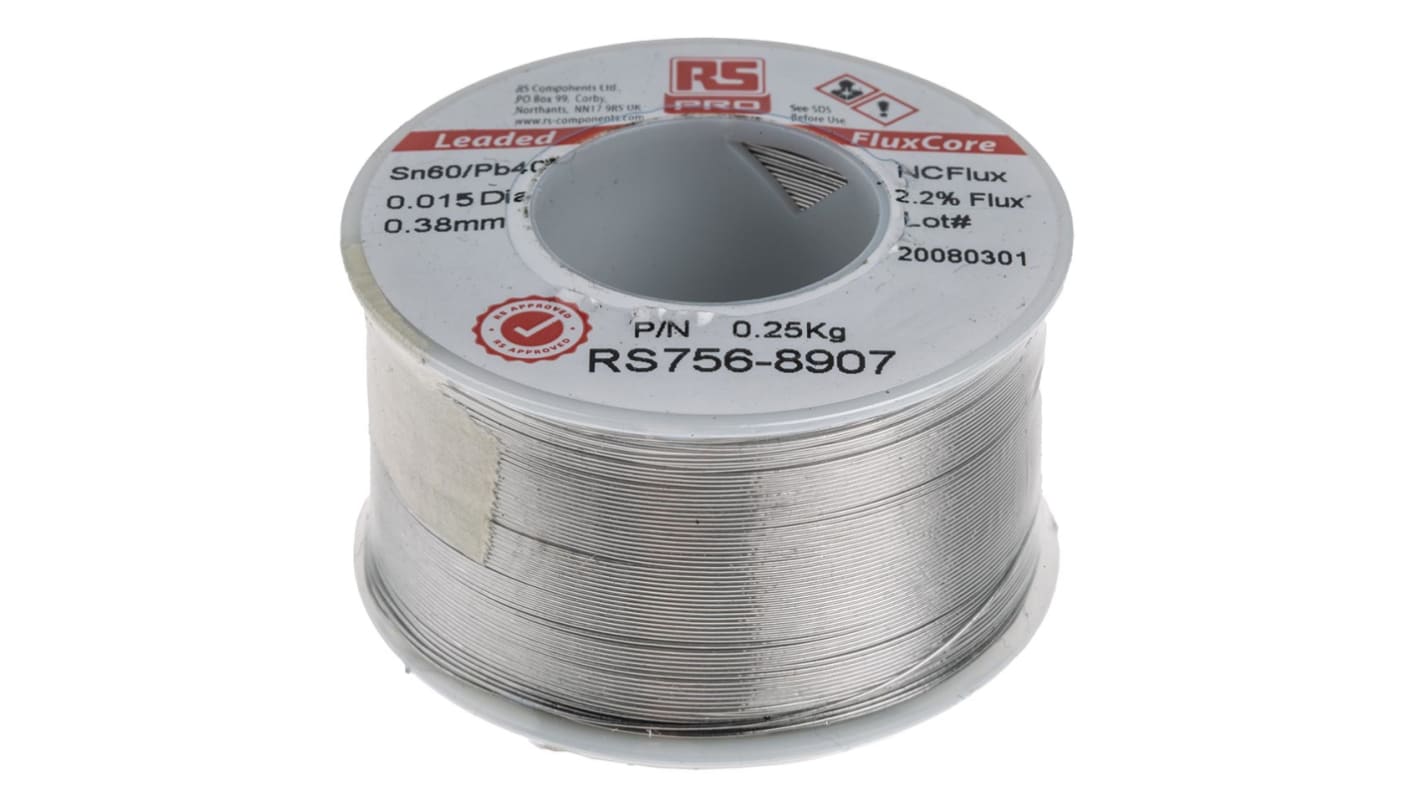RS PRO Wire, 0.38mm Lead solder, 183°C Melting Point
- RS庫存編號:
- 756-8907
- 製造商:
- RS PRO
可享批量折扣
Price 个**
HK$416.90
65 現貨庫存,可於3工作日發貨。*
* 交貨日期可能會根據您選擇的數量和交貨地址而變更。
訂單金額滿 HK$250.00 即可享受 免費 送貨服務
即時庫存查詢
單位 | 每單位 |
|---|---|
| 1 - 19 | HK$416.90 |
| 20 - 99 | HK$404.30 |
| 100 + | HK$332.80 |
** 參考價格
- RS庫存編號:
- 756-8907
- 製造商:
- RS PRO
不相容
- COO (Country of Origin):
- US
60/40 Tin-Lead Alloy Solders
From the trusted RS PRO brand, this resin based solder wire has a 60/40 lead and tin mix. It boasts superior wetting, making it suitable for a wide range of soldering applications.
Features and Benefits
• Resin based 60/40 tin/lead solder wire
• Clear no clean flux residue
• Wets well to all PCB and component finishes
• Ideal for wide range of soldering jobs
• Utilising a synthetically refined resin
• Effective activator package
Applications
Solder is used alongside soldering irons, particularly in securing electrical components to integrated circuit boards. The solder melts easily when heated, and cools quickly, meaning it can be moulded to secure components in place in solder joints. The quick setting nature of solder means it can also be used for light brazing.
Because of its relatively low melting point, solder can be reworked easily by heating it to melting point and using a solder sucker to remove it.
Solder is commonly used with SMD and through-hole components, with applications in repair, prototyping and production.
What are the differences between lead-free solder and leaded solder?
Lead-free solder is generally regarded as having a more positive environmental impact than leaded solder, and also as being safer for human use. However, lead-free solder also has potential production advantages. Lead-free solder can offer better lead spacing, which makes it more suitable for high-density components where pitches are tight. This means potentially better performance where space saving is a concern.
The advantages of lead solder are that it has a lower melting point, which is sometimes preferable for hand working components. Also, lower working temperatures reduces the risk of damage to components and circuit board.
Unlike lead-free solder, lead solder does not have a shelf-life and is less prone to losing quality after prolonged exposure to oxygen. However, many electronic application requirements exclude the use of lead solder, due to the toxicity of lead.
Why RS PRO?
RS PRO aims to be your go-to brand for reliability and value for money. We source great parts at great prices and test everything with our in-house experts to ensure the quality you need.
When it comes to tools, we know that versatility and dependability are what you need. As such, we stock a variety of mainstay and specialist tools to suit any application. Whether you're a professional electrician, technician, engineer or home inventor, RS PRO is here to support you.
Features and Benefits
• Resin based 60/40 tin/lead solder wire
• Clear no clean flux residue
• Wets well to all PCB and component finishes
• Ideal for wide range of soldering jobs
• Utilising a synthetically refined resin
• Effective activator package
Applications
Solder is used alongside soldering irons, particularly in securing electrical components to integrated circuit boards. The solder melts easily when heated, and cools quickly, meaning it can be moulded to secure components in place in solder joints. The quick setting nature of solder means it can also be used for light brazing.
Because of its relatively low melting point, solder can be reworked easily by heating it to melting point and using a solder sucker to remove it.
Solder is commonly used with SMD and through-hole components, with applications in repair, prototyping and production.
What are the differences between lead-free solder and leaded solder?
Lead-free solder is generally regarded as having a more positive environmental impact than leaded solder, and also as being safer for human use. However, lead-free solder also has potential production advantages. Lead-free solder can offer better lead spacing, which makes it more suitable for high-density components where pitches are tight. This means potentially better performance where space saving is a concern.
The advantages of lead solder are that it has a lower melting point, which is sometimes preferable for hand working components. Also, lower working temperatures reduces the risk of damage to components and circuit board.
Unlike lead-free solder, lead solder does not have a shelf-life and is less prone to losing quality after prolonged exposure to oxygen. However, many electronic application requirements exclude the use of lead solder, due to the toxicity of lead.
Why RS PRO?
RS PRO aims to be your go-to brand for reliability and value for money. We source great parts at great prices and test everything with our in-house experts to ensure the quality you need.
When it comes to tools, we know that versatility and dependability are what you need. As such, we stock a variety of mainstay and specialist tools to suit any application. Whether you're a professional electrician, technician, engineer or home inventor, RS PRO is here to support you.
Resin based 60/40 tin/lead solder wire
Clear no clean flux residue
Wets well to all PCB and component finishes
Ideal for wide range of soldering jobs
Superior wetting
Utilising a synthetically refined resin
Effective activator package
Clear no clean flux residue
Wets well to all PCB and component finishes
Ideal for wide range of soldering jobs
Superior wetting
Utilising a synthetically refined resin
Effective activator package
Standards
J-STD-004 classification REL0
Standards
J-STD-004 classification REL0
Attribute | Value |
|---|---|
| Wire Diameter | 0.38mm |
| Model Number | NC600 |
| Percent Lead | 40% |
| Product Form | Wire |
| Melting Point | 183°C |
| Percent Tin | 60% |
| Flux Type | Rosin Based |
| Product Weight | 250g |
| Flux Content Percent | 2.2% |


